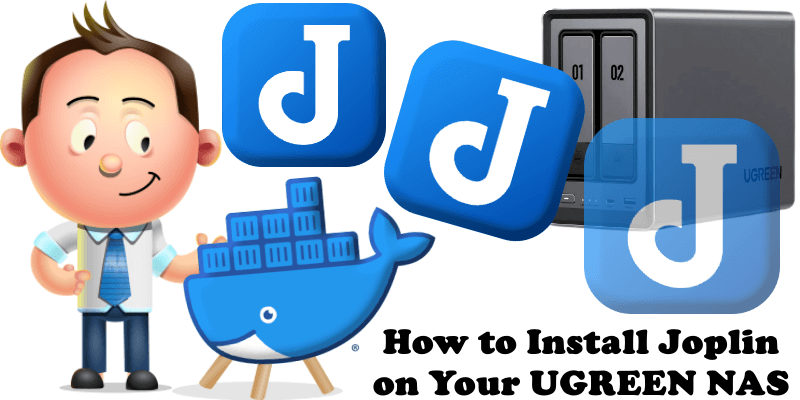
Joplin is a free, open source note taking and to-do application, which can handle a large number of notes organized into notebooks. The notes are searchable, can be copied, tagged and modified either from the applications directly or from your own text editor. The notes are in Markdown format. Notes exported from Evernote via .enex files can be imported into Joplin, including the formatted content (which is converted to Markdown), resources (images, attachments, etc.) and complete metadata (geolocation, updated time, created time, etc.). Plain Markdown files can also be imported. The notes can be synchronized with various cloud services including Nextcloud, Dropbox, OneDrive, WebDAV or the file system (for example with a network directory). When synchronizing the notes, notebooks, tags and other metadata are saved to plain text files which can be easily inspected, backed up and moved around. In this step by step guide I will show you how to install Joplin on your UGREEN NAS using Docker & Portainer.
This guide works perfectly with the latest Joplin v3.5.2 release.
STEP 1
Please Support My work by Making a Donation.
STEP 2
Install Portainer using my step by step guide. If you already have Portainer installed on your UGREEN NAS, skip this STEP. Attention: Make sure you have installed the latest Portainer version.
STEP 3
⚠️Mandatory: Enable HTTPS on your UGREEN NAS.
STEP 4
Create a new hostname on the noip website using your noip account. For example, I have created mariusjoplin as Host and I use the free ddns.net domain. In the IP Address area, type in your own IPV4 IP address from your ISP, then click Create. Follow the instructions in the image below.
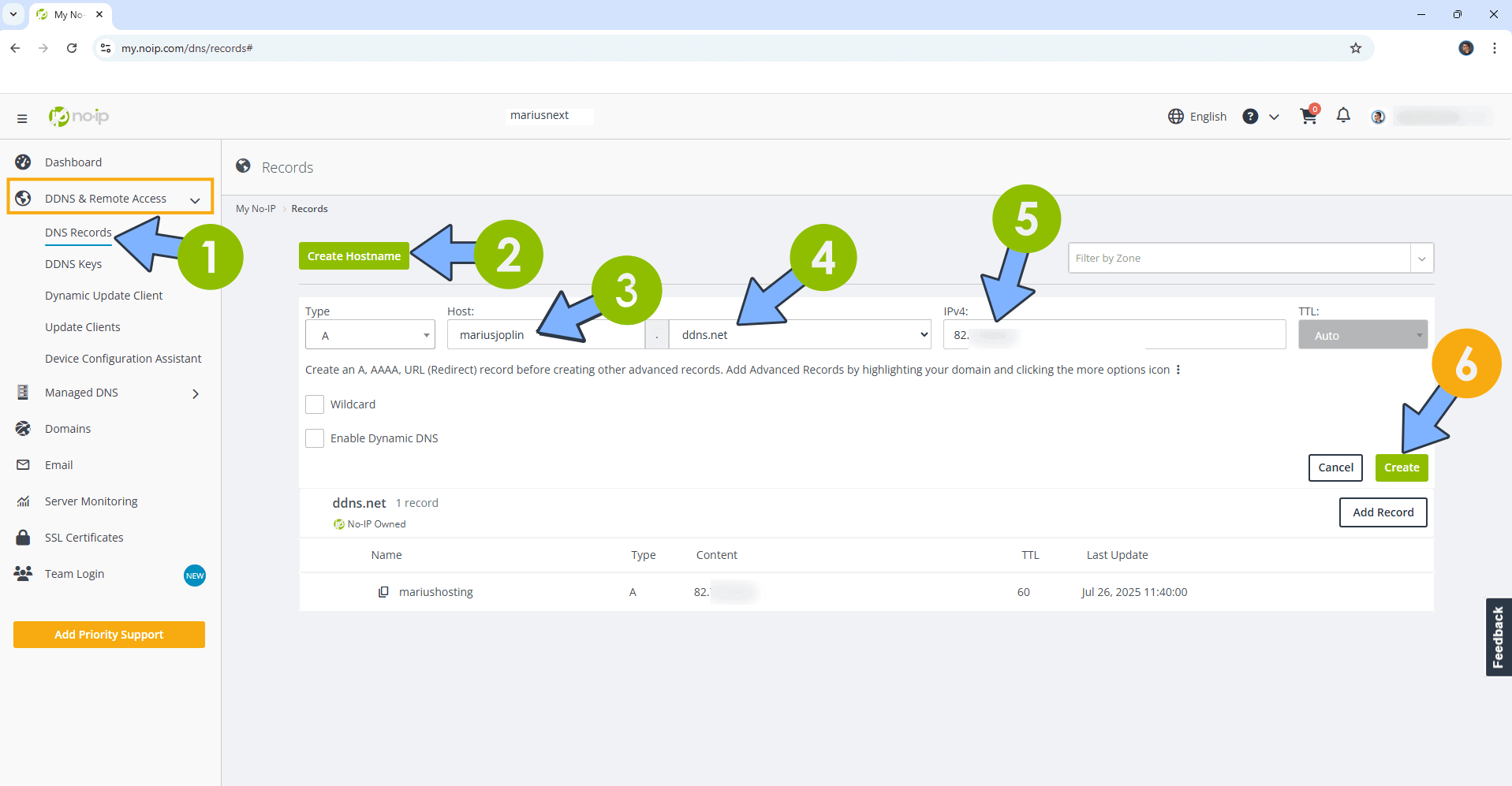
STEP 5
Go to Files and open the docker folder. Inside the docker folder, create one new folder and name it joplin. Follow the instructions in the image below.
Note: Be careful to enter only lowercase, not uppercase letters.
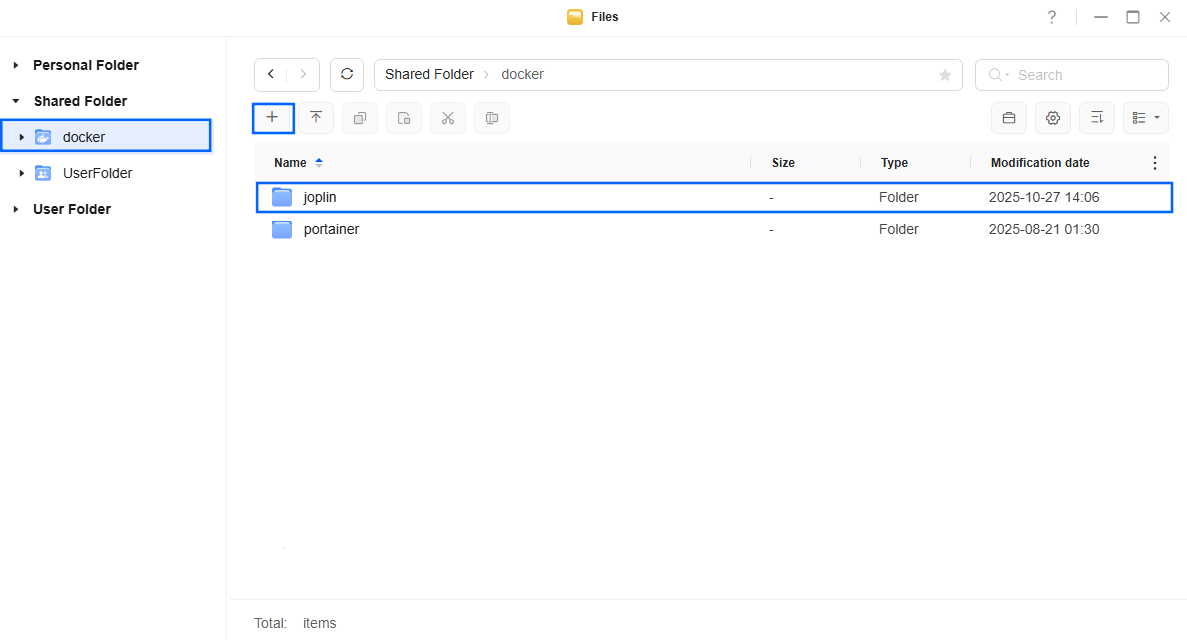
STEP 6
Follow my step by step guide on how to activate SMTP for your Gmail account. This step is mandatory. Note: If you don’t want to use the easiest way for SMTP with Google and you already have SMTP details from your own Mail Server, you can just skip this STEP and use your personalized email SMTP details instead.
STEP 7
Log into Portainer using your username and password. On the left sidebar in Portainer, click on Home then Live connect. Follow the instructions in the image below.

On the left sidebar in Portainer, click on Stacks then + Add stack. Follow the instructions in the image below.

STEP 8
In the Name field type in joplin. Follow the instructions in the image below.
services:
db:
image: postgres:18
container_name: Joplin-DB
hostname: joplin-db
security_opt:
- no-new-privileges:true
user: 999:10
healthcheck:
test: ["CMD", "pg_isready", "-q", "-d", "joplin", "-U", "joplinuser"]
timeout: 45s
interval: 10s
retries: 10
volumes:
- /volume1/docker/joplin:/var/lib/postgresql:rw
environment:
POSTGRES_DB: joplin
POSTGRES_USER: joplinuser
POSTGRES_PASSWORD: joplinpass
restart: on-failure:5
joplin:
image: joplin/server:latest
container_name: Joplin
depends_on:
- db
ports:
- 22300:22300
environment:
APP_PORT: 22300
APP_BASE_URL: https://mariusjoplin.ddns.net
DB_CLIENT: pg
POSTGRES_PASSWORD: joplinpass
POSTGRES_DATABASE: joplin
POSTGRES_USER: joplinuser
POSTGRES_PORT: 5432
POSTGRES_HOST: db
MAX_TIME_DRIFT: 0
MAILER_ENABLED: 1
MAILER_HOST: smtp.gmail.com
MAILER_PORT: 587
MAILER_SECURITY: starttls
MAILER_AUTH_USER: Your-own-gmail-address
MAILER_AUTH_PASSWORD: Your-own-app-password
MAILER_NOREPLY_NAME: Your-own-gmail-address
MAILER_NOREPLY_EMAIL: Your-own-gmail-address
restart: on-failure:5
Note: Before you paste the code above in the Web editor area below, change the value numbers for user with your own UID and GID values. (Follow my step by step guide on how to do this.) 999 is my personal UID value and 10 is my personal GID value. You have to type in your own values.
Note: After you paste the code in the Web editor, change the value for APP_BASE_URL with your own NO IP DDNS address that you have previously created at STEP 4 with https:// at the beginning. If you want to use Joplin locally just change the value for APP_BASE_URL with your own local NAS IP followed by :22300 Example: APP_BASE_URL: http://192.168.1.18:22300
Note: Before you paste the code above in the Web editor area below, change the value for MAILER_AUTH_USER and type in your own Gmail address. STEP 6.
Note: Before you paste the code above in the Web editor area below, change the value for MAILER_AUTH_PASSWORD and type in your own Gmail app password. STEP 6.
Note: Before you paste the code above in the Web editor area below, change the value for MAILER_NOREPLY_NAME and type in your own Gmail address. STEP 6.
Note: Before you paste the code above in the Web editor area below, change the value for MAILER_NOREPLY_EMAIL and type in your own Gmail address. STEP 6.
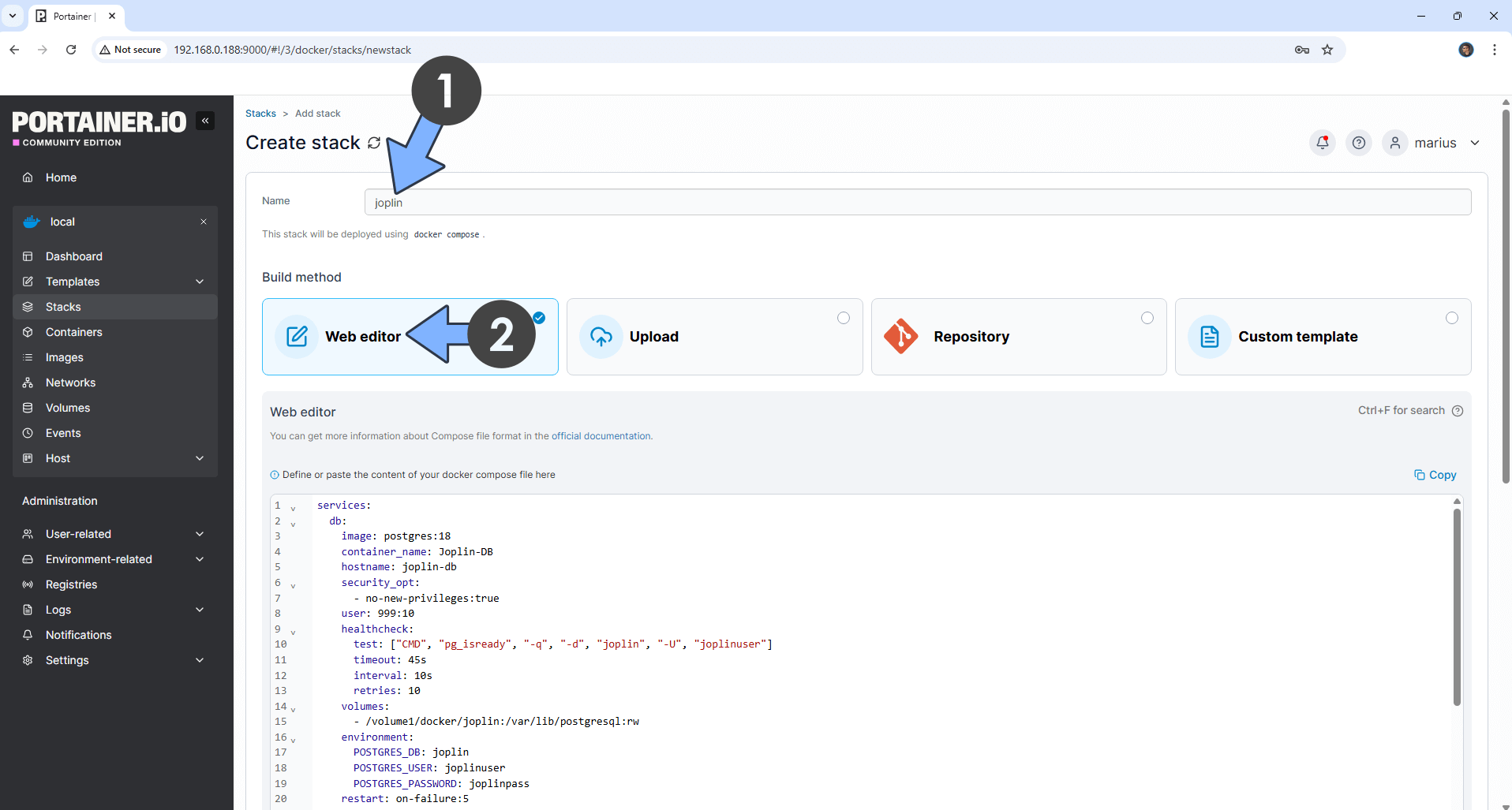
STEP 9
Scroll down on the page until you see a button named Deploy the stack. Click on it. Follow the instructions in the image below. The installation process can take up to a few minutes. It will depend on your Internet speed connection.
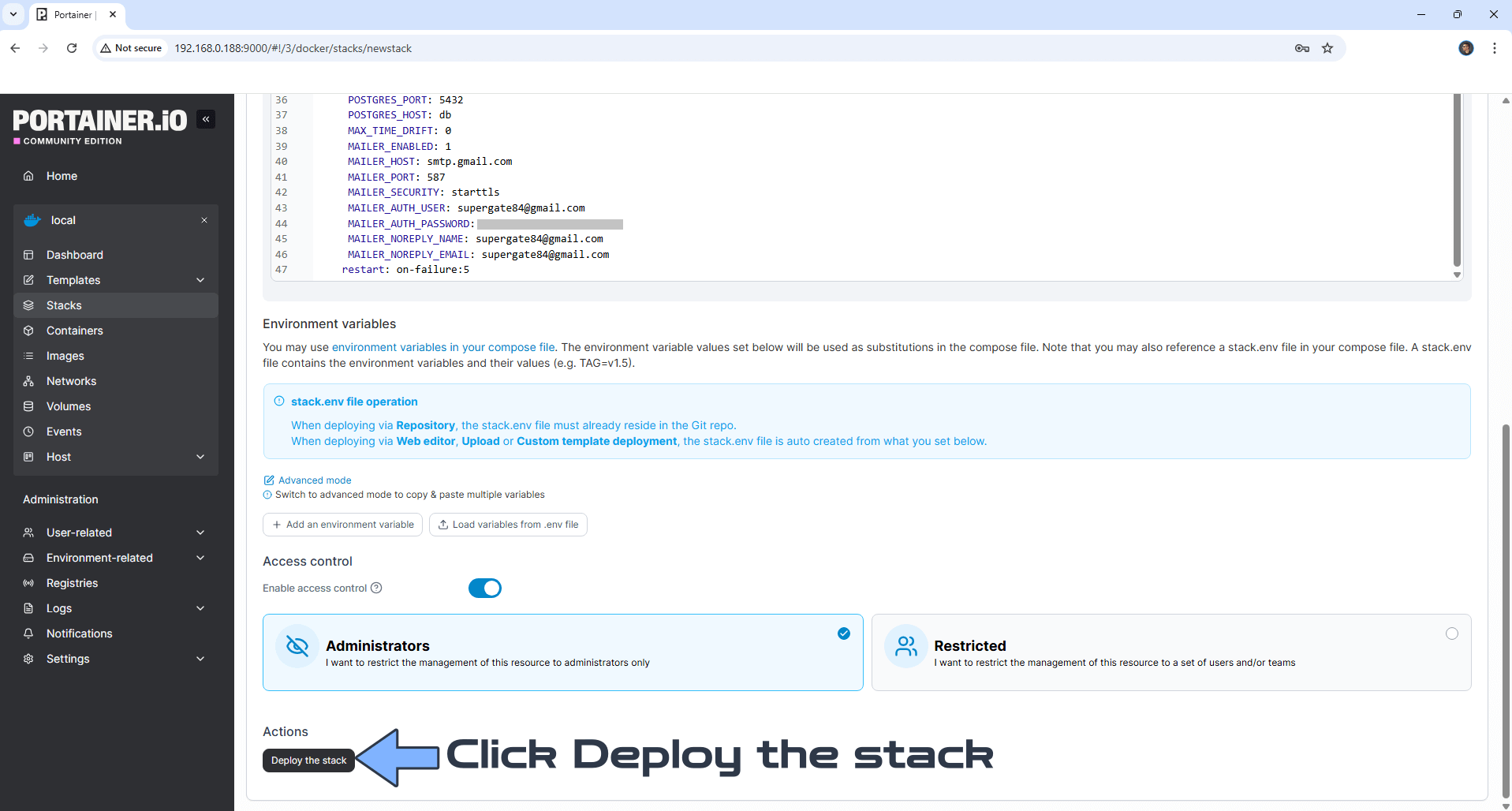
STEP 10
If everything goes right, you will see this message at the top right of your screen: “Success Stack successfully deployed“.

STEP 11
Open your Nginx Proxy Manager container that you have previously installed at STEP 3. Click Add Proxy Host. A new pop up window will open. Add the following details:
Domain Names: Type in your own noip domain name that you have previously created at STEP 4.
Scheme: http
Forward Hostname/IP: Type in the local NAS IP of your UGREEN NAS.
Forward Port: Type in the Joplin local Port that is 22300
Check Block Common Exploits
Check Websockets Support
Click the SSL tab. Follow the instructions in the image below.
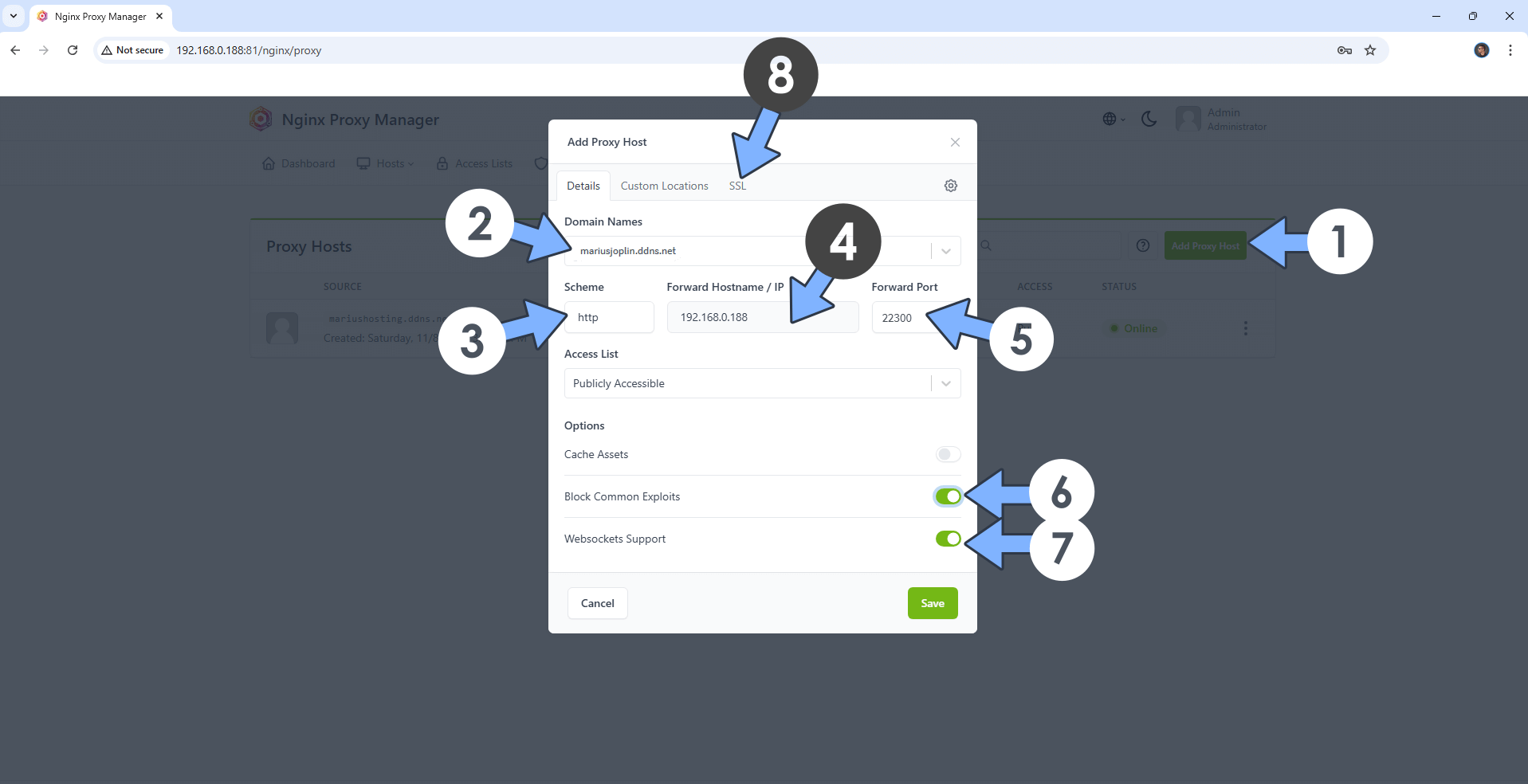
STEP 12
After you click the SSL tab, add the following details:
SSL Certificate: Request a new SSL Certificate
Check: Force SSL
Check: HSTS Enabled
Check: HTTP/2 Support
Click Save. Follow the instructions in the image below.
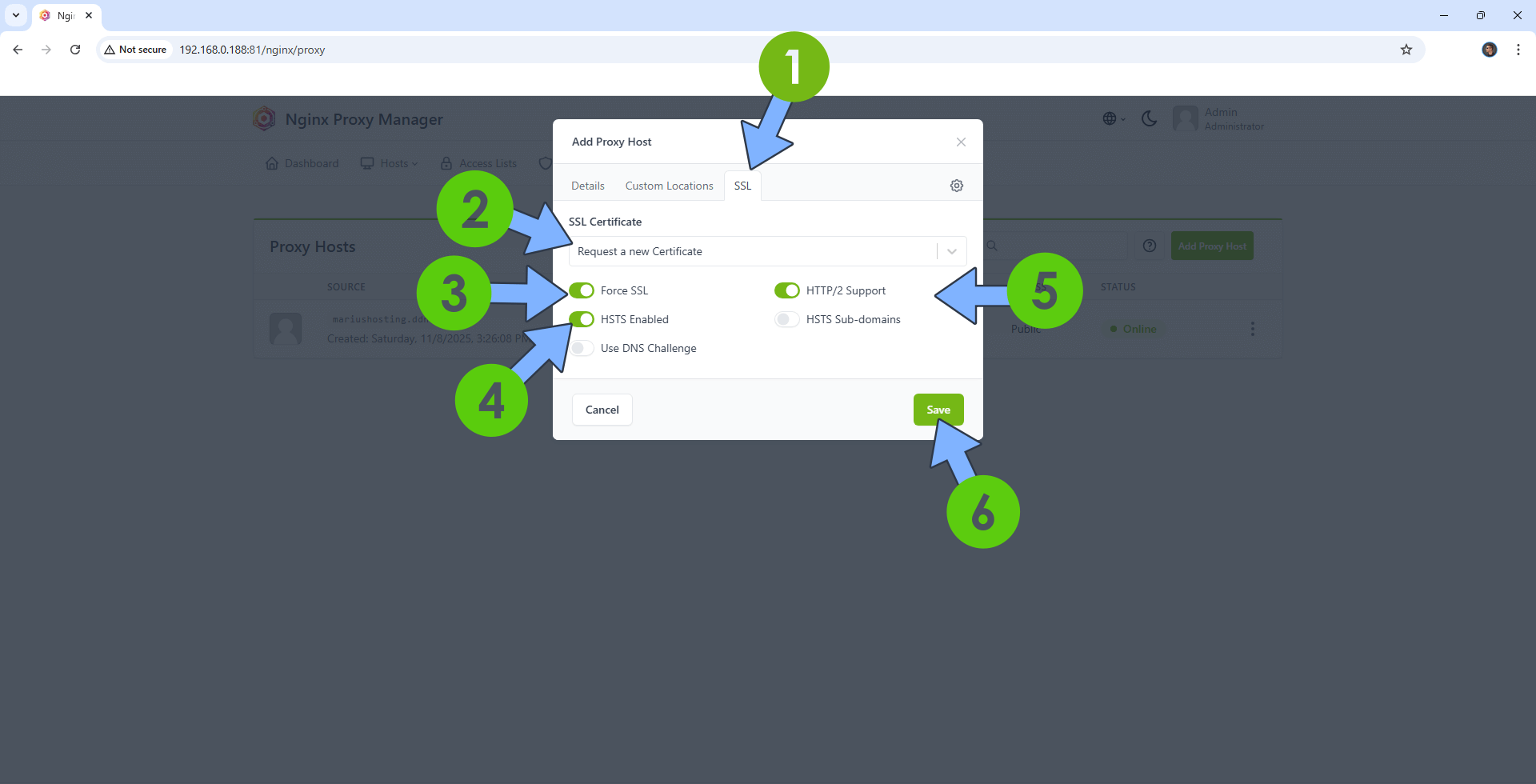
STEP 13
In the Proxy Hosts area, if everything goes right, you will see that your joplin hostname has been generated. Click on it. Follow the instructions in the image below.
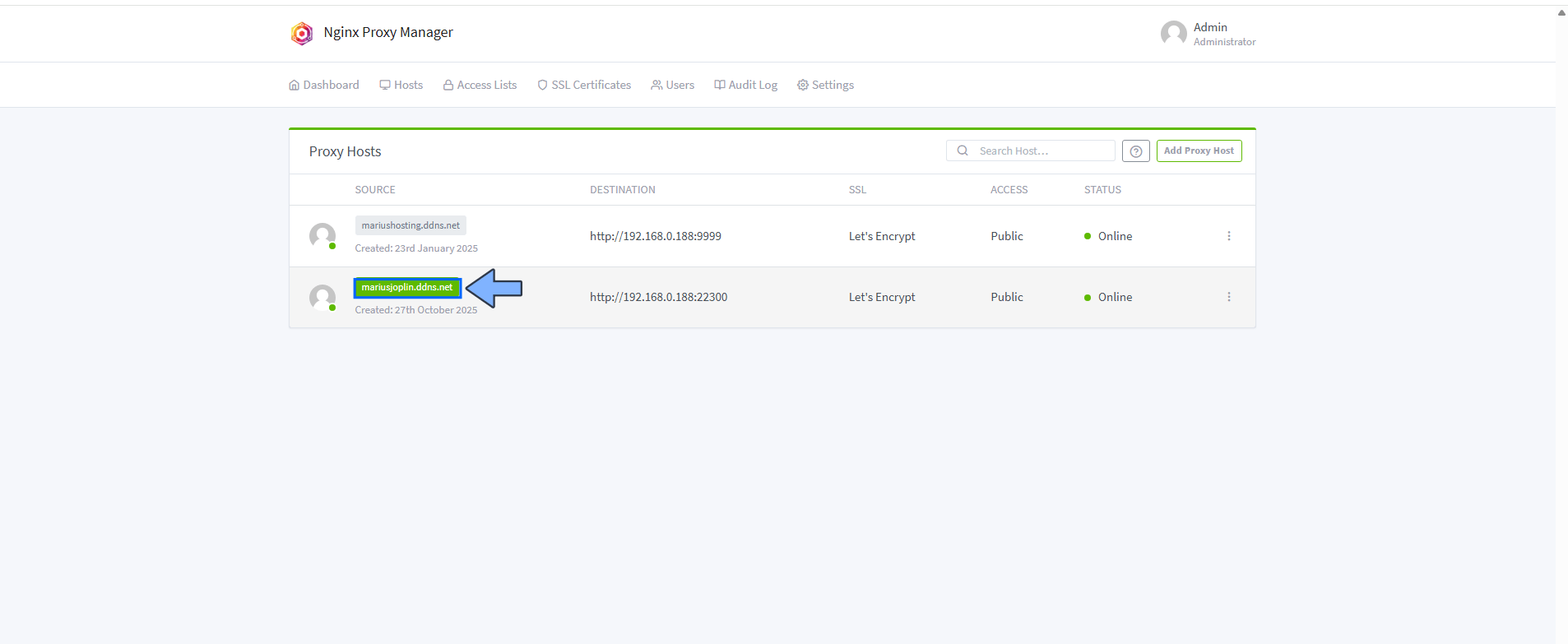
STEP 14
🟢Please Support My work by Making a Donation. Almost 99,9% of the people that install something using my guides forget to support my work, or just ignore STEP 1. I’ve been very honest about this aspect of my work since the beginning: I don’t run any ADS, I don’t require subscriptions, paid or otherwise, I don’t collect IPs, emails, and I don’t have any referral links from Amazon or other merchants. I also don’t have any POP-UPs or COOKIES. I have repeatedly been told over the years how much I have contributed to the community. It’s something I love doing and have been honest about my passion since the beginning. But I also Need The Community to Support me Back to be able to continue doing this work.
STEP 15
Now open your browser and type in your HTTPS/SSL certificate like this https://joplin.ddns.net In my case it’s https://mariusjoplin.ddns.net If everything goes right you will see the Joplin login page. Type in the default Email and Password. Follow the instructions in the image below.
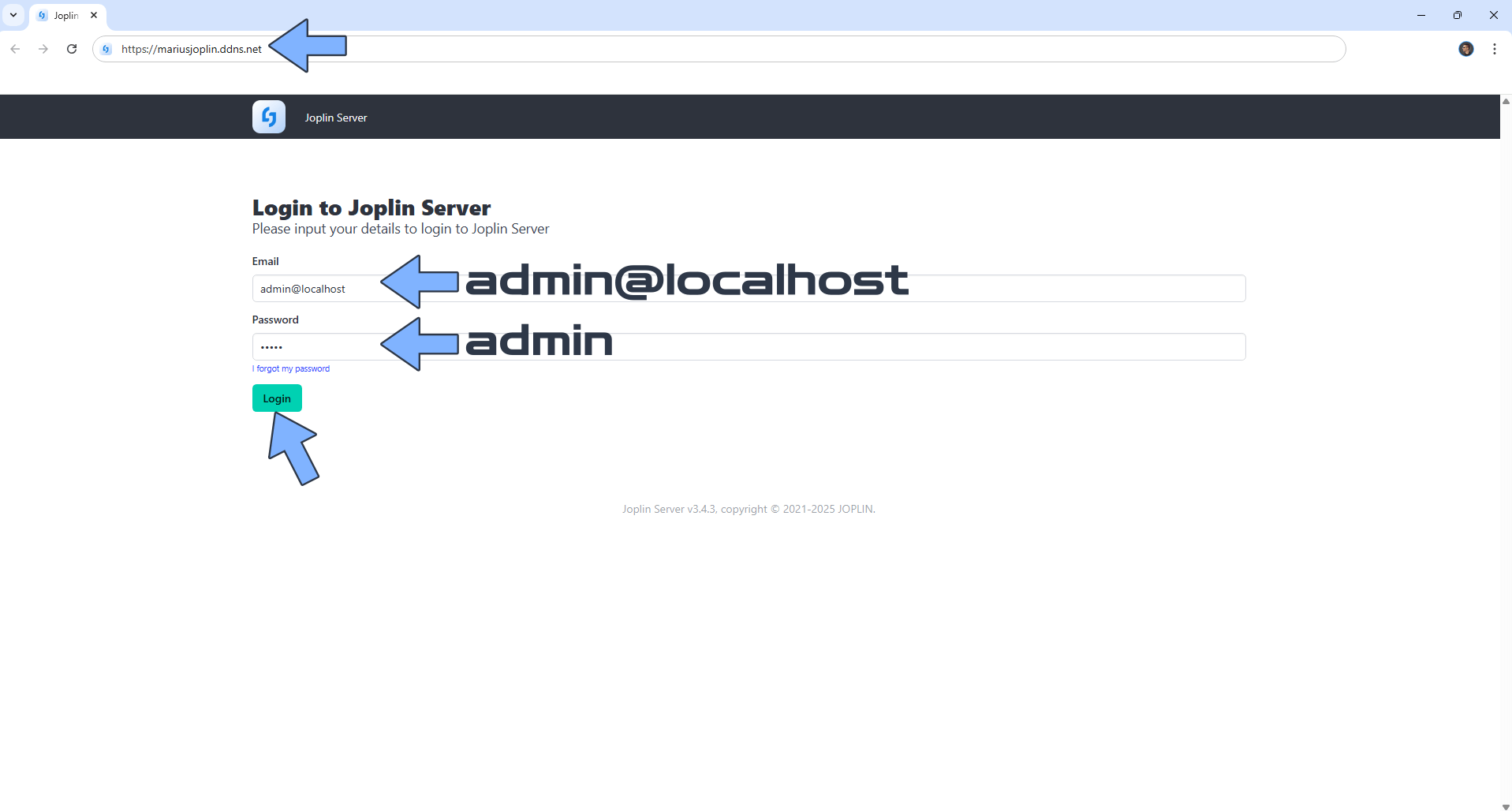
STEP 16
You will be prompted to change the admin password. Click Change it now. Follow the instructions in the image below.
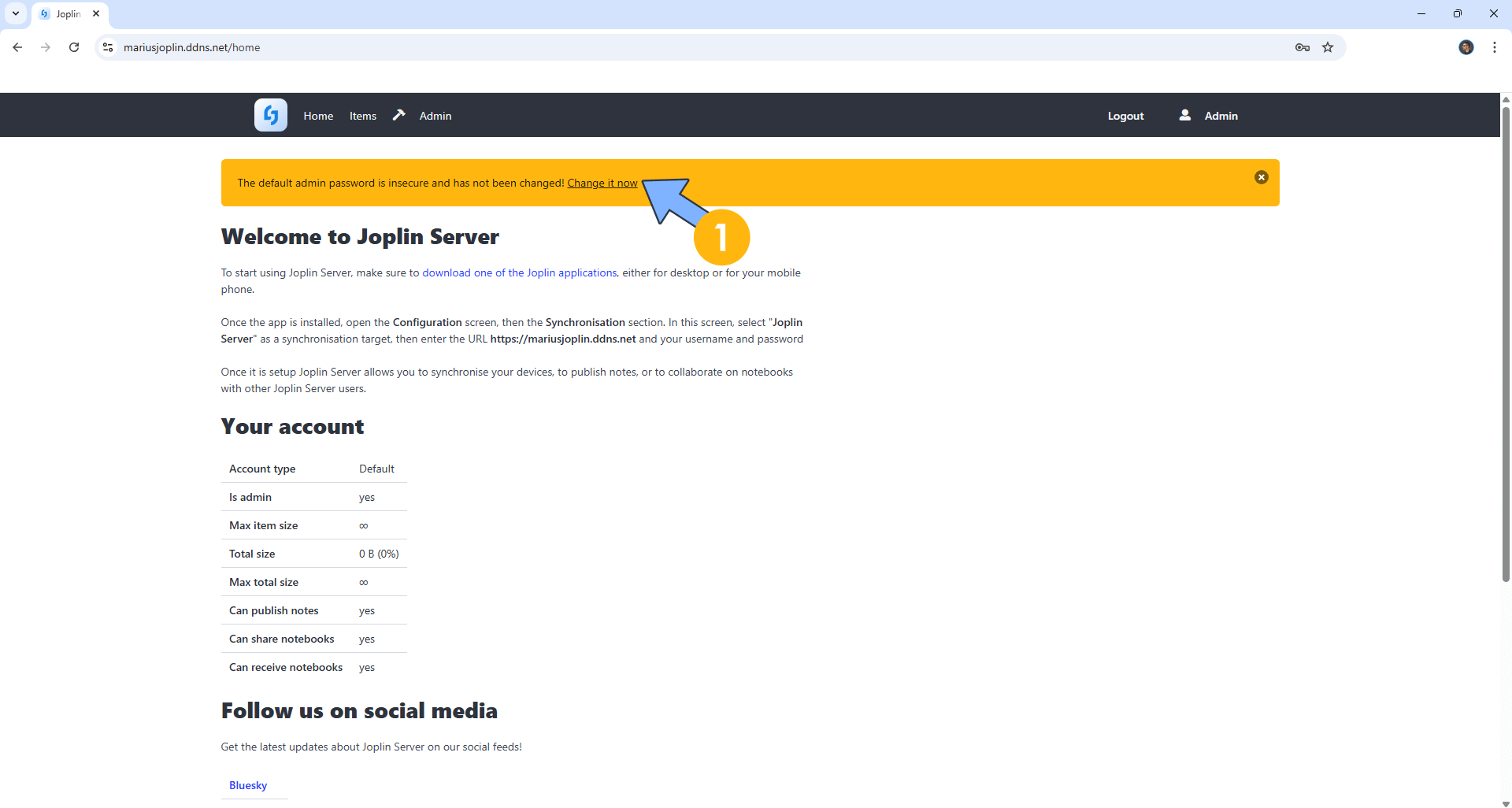
STEP 17
Type in your Full name, Email and Password then click Update profile. Follow the instructions in the image below.
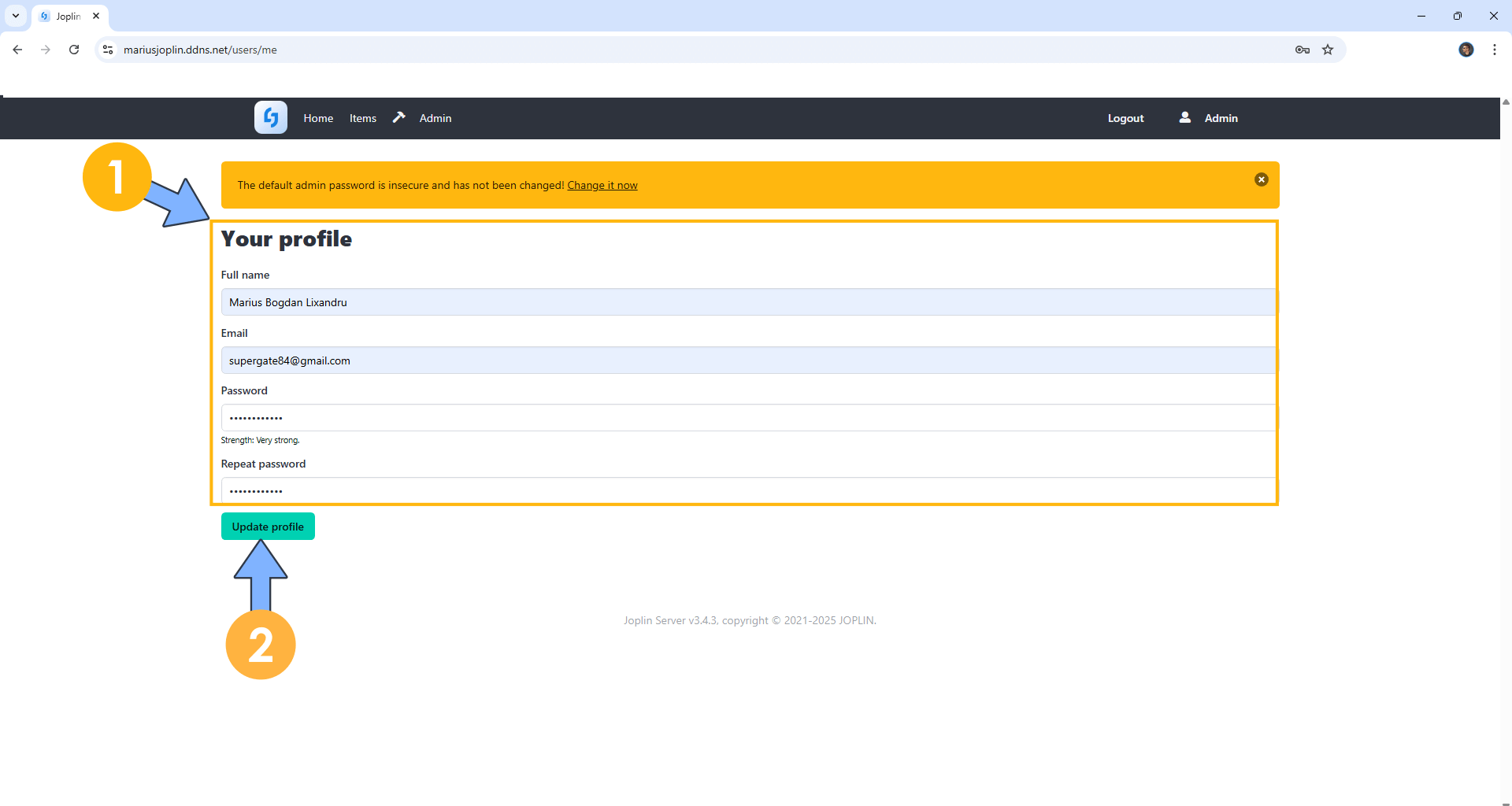
STEP 18
Check your Confirmation Email, then click Confirm Email. Follow the instructions in the image below.
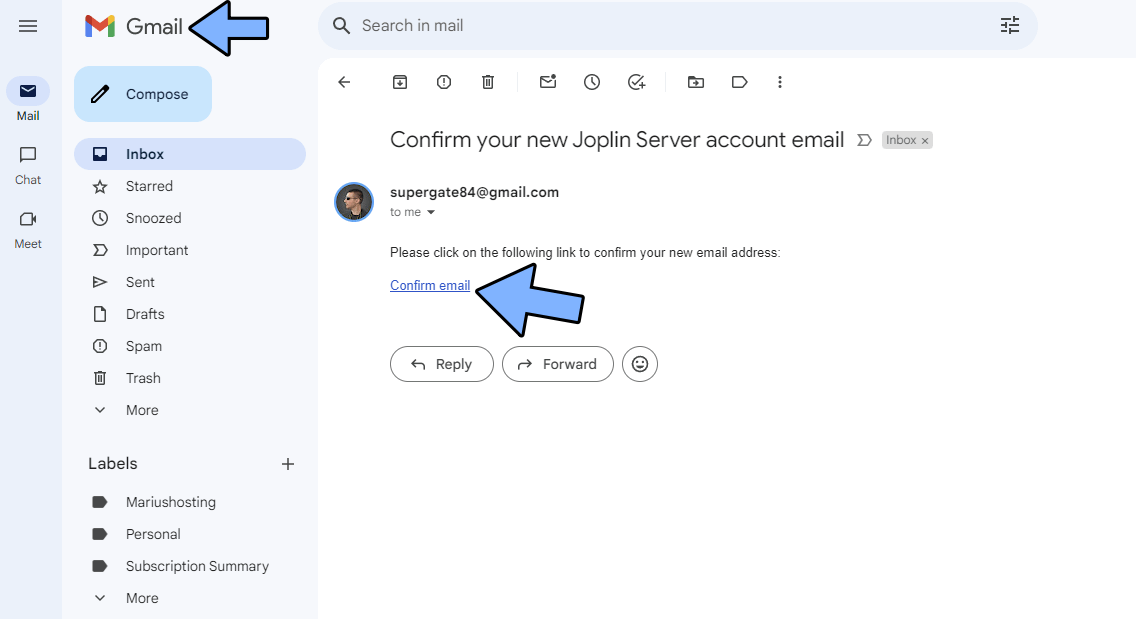
STEP 19
Log in using your new credentials that you have previously added at STEP 17, then click Login. Follow the instructions in the image below.
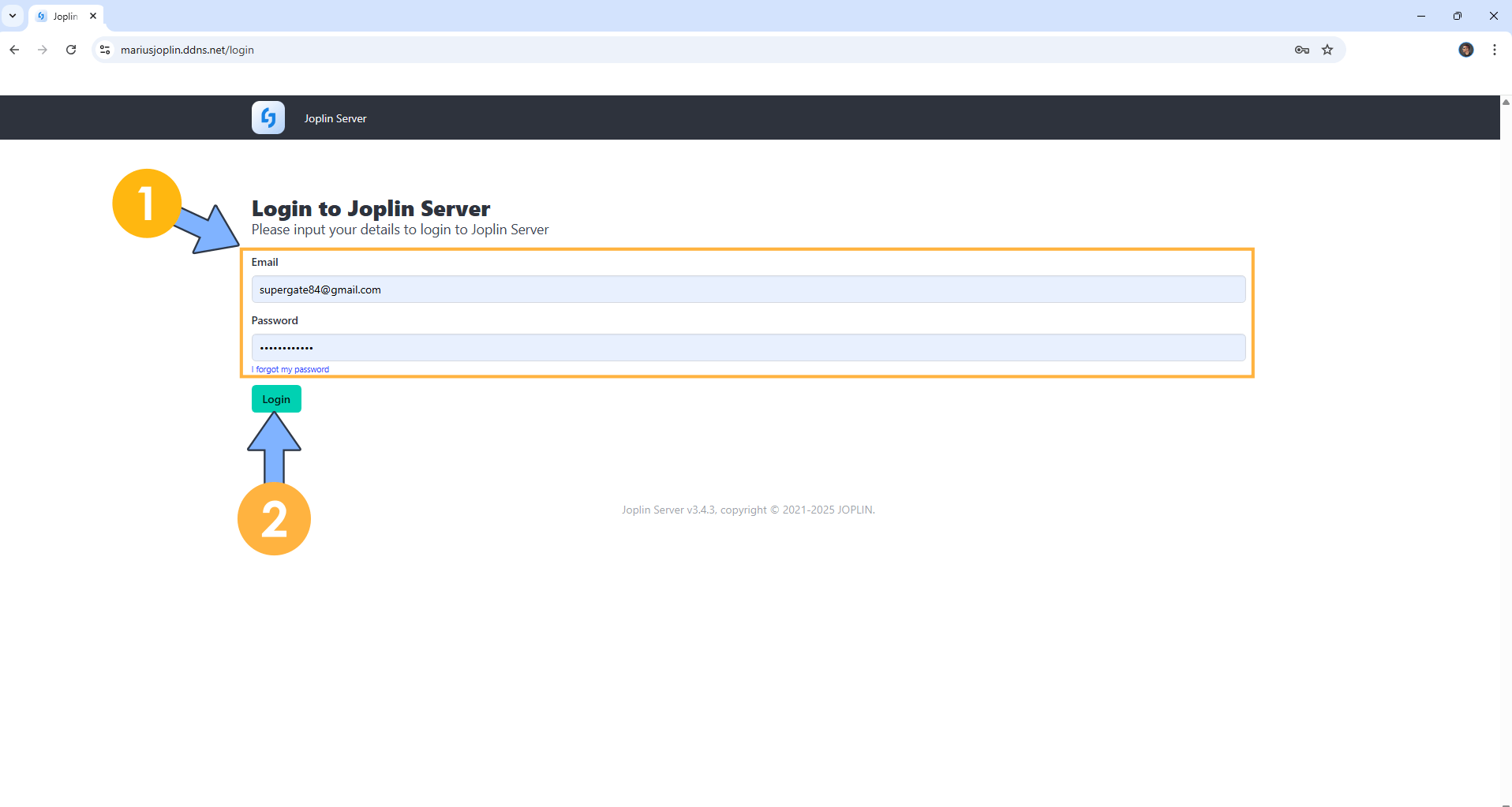
STEP 20
Your email has been confirmed.
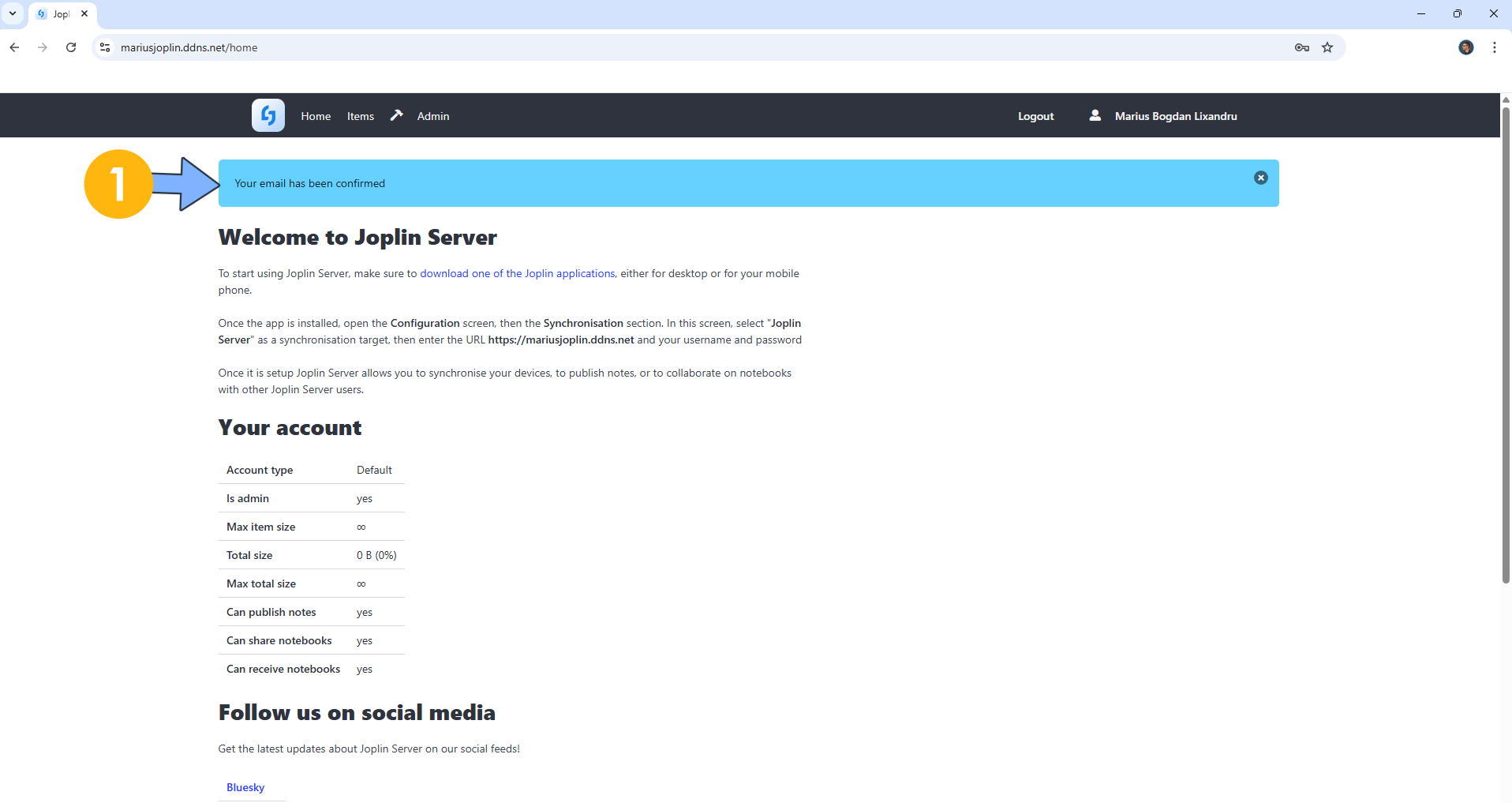
STEP 21
Click the Admin tab to access your Administration page. Follow the instructions in the image below.
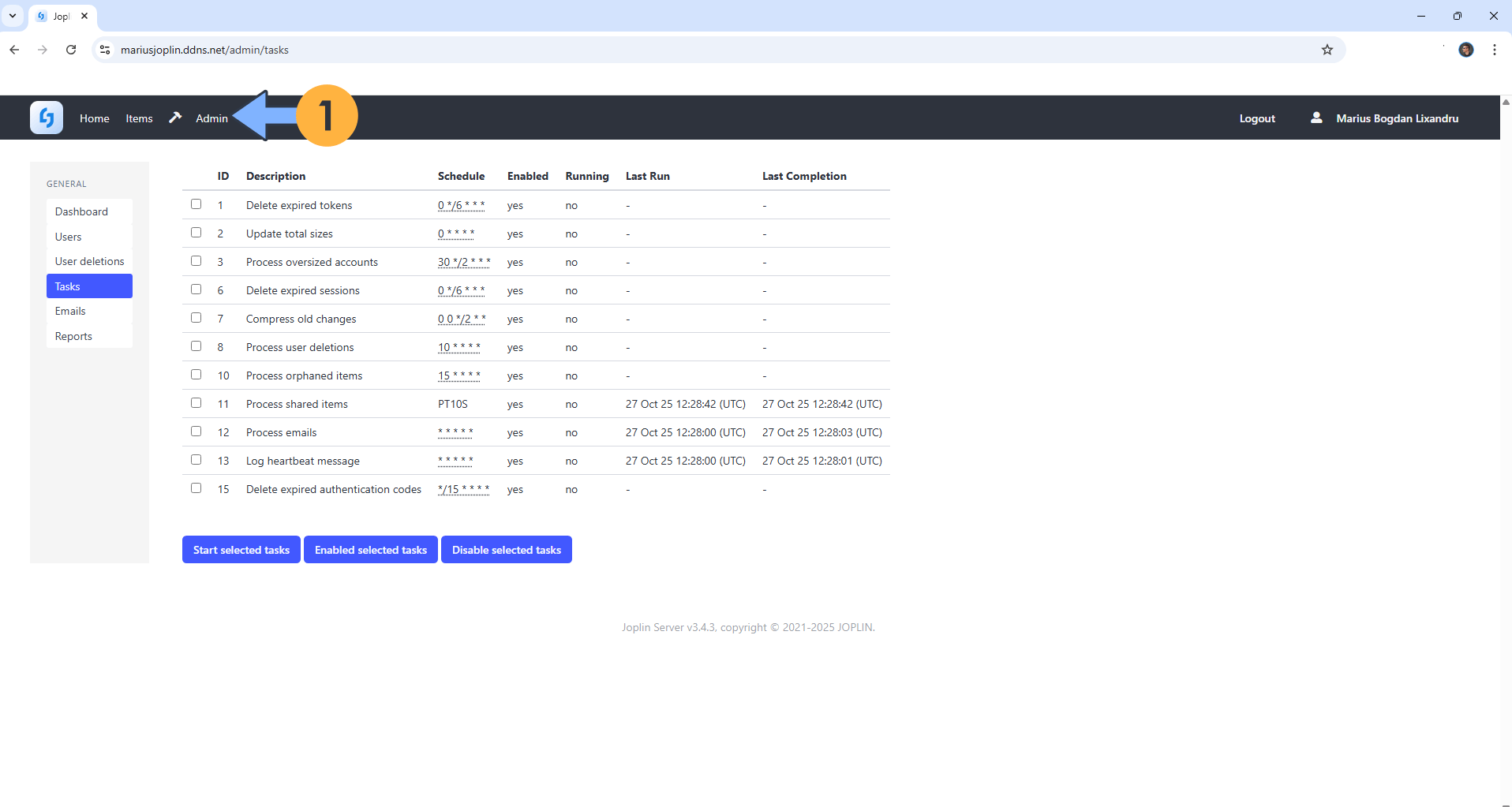
Enjoy Joplin!
🆙Note/Update/Container: How to Update Your Docker Containers on UGREEN NAS Using Portainer.
🐳Note: How to Create Docker Shortcuts on Desktop.
🆕Note: How to Update Portainer to the latest version.
🆕Note: How to Clean Docker.
This post was updated on Thursday / January 1st, 2026 at 7:05 PM
